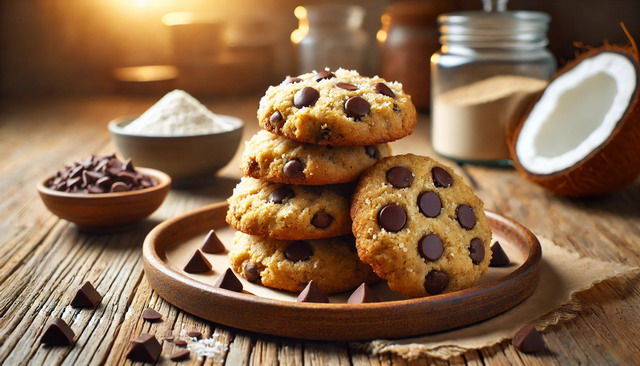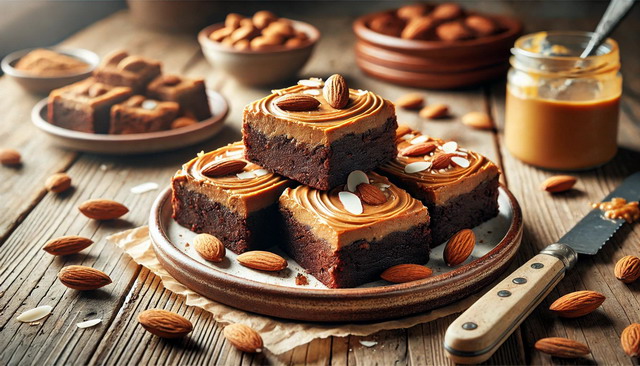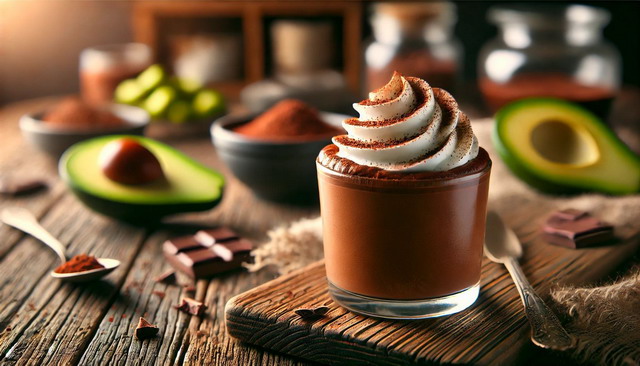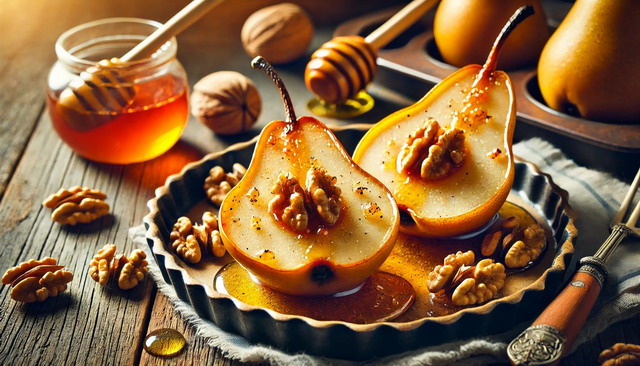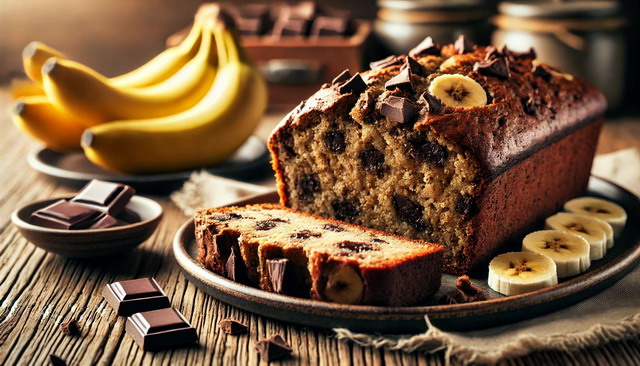Coconut flour chocolate chip cookies are a delightful and healthier alternative to traditional cookies, offering a unique blend of flavor and nutrition. Made from finely ground coconut meat, coconut flour is naturally gluten-free, high in fiber, and low in carbohydrates, making it an excellent choice for those with dietary restrictions or health-conscious bakers. These cookies combine the rich, decadent taste of chocolate chips with the subtle sweetness of coconut, resulting in a treat that satisfies both your taste buds and your nutritional goals. Whether you’re following a gluten-free, keto, or paleo diet, coconut flour chocolate chip cookies are a perfect way to enjoy a classic dessert without the guilt.
What is Coconut Flour?
Coconut flour is an increasingly popular alternative to traditional wheat flour, especially among those who are health-conscious or have dietary restrictions. But what exactly is coconut flour, and why has it become such a staple in the world of healthy baking?
Coconut flour is made from the flesh of coconuts. After the coconut milk is extracted from the meat, the remaining flesh is dried and ground into a fine, soft powder, creating what we know as coconut flour. This process results in a flour that is not only gluten-free but also high in fiber, low in carbohydrates, and rich in healthy fats. These qualities make coconut flour a favorite among those following gluten-free, paleo, or keto diets.
One of the most notable characteristics of coconut flour is its high fiber content. Just two tablespoons of coconut flour contain around 5 grams of fiber, which is about 20% of the recommended daily intake for adults. This high fiber content not only aids in digestion but also helps to regulate blood sugar levels, making it a beneficial ingredient for those managing diabetes or looking to maintain stable energy levels throughout the day.
In addition to its health benefits, coconut flour has a subtle, slightly sweet flavor that pairs well with many baked goods. This makes it an excellent choice for recipes like chocolate chip cookies, where the natural sweetness of the flour can complement the rich, decadent flavor of the chocolate.
However, baking with coconut flour does require some adjustments. Coconut flour is highly absorbent, meaning it soaks up liquid much more than regular flour. This can lead to dry, crumbly baked goods if the recipe is not properly adjusted. Typically, recipes that use coconut flour require more eggs or other liquid ingredients to maintain the right consistency.
Coconut flour is also denser than wheat flour, so it’s often used in smaller quantities. A common rule of thumb is to use about 1/4 to 1/3 cup of coconut flour for every cup of wheat flour a recipe calls for. This might seem like a small amount, but because of its absorbency and density, a little coconut flour goes a long way.
Why Choose Coconut Flour for Chocolate Chip Cookies?
Chocolate chip cookies are a beloved classic, but they’re often packed with refined sugar, unhealthy fats, and processed flour. For those who are health-conscious, have gluten sensitivities, or follow specific diets like paleo or keto, traditional chocolate chip cookies can be off-limits. This is where coconut flour comes in as a game-changer.
Choosing coconut flour for your chocolate chip cookies offers several advantages. First and foremost, it’s a gluten-free alternative. Gluten is a protein found in wheat and other grains, and it’s what gives dough its elasticity. However, gluten can cause digestive issues for many people, particularly those with celiac disease or gluten sensitivities. Coconut flour allows you to enjoy the classic taste of chocolate chip cookies without worrying about gluten.
In addition to being gluten-free, coconut flour is also lower in carbohydrates compared to wheat flour. This makes it an excellent choice for those following a low-carb or ketogenic diet. Traditional chocolate chip cookies can cause a spike in blood sugar levels due to their high carbohydrate content, but coconut flour helps to mitigate this. The high fiber content in coconut flour slows down the absorption of sugar, leading to a more gradual rise in blood sugar and a longer-lasting feeling of fullness.
Another benefit of using coconut flour is that it’s rich in healthy fats, particularly medium-chain triglycerides (MCTs). MCTs are a type of fat that is easily digested and can be used by the body for quick energy. Some studies suggest that MCTs can help with weight management and improve cognitive function, making them a valuable addition to your diet.
Coconut flour also has a unique flavor profile that can enhance the taste of your cookies. The subtle sweetness of coconut flour pairs well with chocolate, adding an extra layer of flavor to your cookies without overpowering the classic chocolate chip taste. This natural sweetness means you can often reduce the amount of added sugar in your recipe, making your cookies a healthier treat overall.
However, baking with coconut flour does require some adjustments, especially when it comes to moisture content. As mentioned earlier, coconut flour is highly absorbent, which means it can make your cookie dough very thick and dry if not properly balanced with liquids. To counteract this, recipes often call for extra eggs, which not only add moisture but also help bind the dough together. You might also need to increase the amount of liquid sweeteners, such as honey or maple syrup, to maintain the right texture.
When done correctly, the result is a batch of chocolate chip cookies that are not only delicious but also packed with nutritional benefits. They’re perfect for anyone looking to indulge in a sweet treat without compromising their health goals. Whether you’re gluten-free, following a low-carb diet, or simply looking to add more fiber and healthy fats to your diet, coconut flour chocolate chip cookies are a fantastic option.
In summary, coconut flour offers a healthier, gluten-free alternative to traditional wheat flour, making it an excellent choice for those who want to enjoy chocolate chip cookies without the guilt. With its high fiber content, low carbohydrate count, and rich, natural flavor, coconut flour transforms a classic indulgence into a nutritious treat that everyone can enjoy.
Ingredients You Need
When it comes to making coconut flour chocolate chip cookies, selecting the right ingredients is crucial for achieving the best texture and flavor. Coconut flour, due to its unique properties, requires a specific balance of ingredients to ensure your cookies turn out soft, chewy, and full of flavor. Let’s take a closer look at the essential ingredients you’ll need.
Gluten-Free Coconut Flour
The star of the show is, of course, coconut flour. As mentioned earlier, coconut flour is gluten-free, making it an ideal choice for those with celiac disease or gluten sensitivities. However, not all coconut flour is created equal. When choosing coconut flour, look for a high-quality, finely milled product that is free from additives. This ensures a smooth texture in your cookies and consistent results.
Some popular brands that offer high-quality coconut flour include Bob’s Red Mill, Nutiva, and Anthony’s Goods. These brands are known for their fine milling process, which results in a light and fluffy flour that blends well into your cookie dough. It’s also worth noting that coconut flour is highly absorbent, so you’ll only need a small amount compared to regular flour. Typically, a recipe that calls for one cup of wheat flour can be substituted with about 1/4 to 1/3 cup of coconut flour.
Eggs
Eggs play a vital role in coconut flour recipes, particularly in baking. Due to the absorbent nature of coconut flour, the dough can become quite dense and dry if not balanced with enough moisture. Eggs provide this necessary moisture, while also helping to bind the ingredients together. In most coconut flour recipes, you’ll find that the number of eggs is higher than in traditional recipes. For example, a typical coconut flour cookie recipe might require three to four eggs to achieve the right consistency.
If you’re looking for a vegan option or simply want to reduce the number of eggs, you can experiment with egg substitutes like flax eggs (a mixture of ground flaxseeds and water) or chia eggs (ground chia seeds and water). These alternatives can work well, though they might slightly alter the texture of the cookies.
Sweeteners
Coconut flour has a natural sweetness, which means you can often reduce the amount of added sugar in your recipe. However, you’ll still need some form of sweetener to bring out the full flavor of the chocolate and enhance the overall taste of the cookies. Common sweeteners include:
- Honey: A natural sweetener that pairs well with coconut flour, adding moisture and a mild sweetness.
- Maple Syrup: Another natural option that adds a rich, caramel-like flavor to the cookies.
- Coconut Sugar: A granulated sweetener derived from the sap of coconut palm trees, offering a lower glycemic index than regular sugar.
- Stevia or Erythritol: For those on a low-carb or ketogenic diet, these zero-calorie sweeteners are a great choice, providing sweetness without the added carbs.
When choosing your sweetener, consider the flavor profile you want to achieve. Honey and maple syrup will add more moisture to the dough, while granulated sweeteners like coconut sugar will create a slightly denser texture.
Fat Sources
To achieve the perfect chewy texture in your coconut flour chocolate chip cookies, it’s important to include a source of fat. This can come from various ingredients, depending on your dietary preferences:
- Coconut Oil: A natural choice that complements the flavor of coconut flour, adding richness and moisture to the cookies. Make sure to use melted coconut oil to easily incorporate it into the dough.
- Butter or Ghee: These traditional fats add a buttery flavor and a tender texture to the cookies. Ghee, which is clarified butter, is a good option for those who are lactose intolerant.
- Nut Butters: Almond butter, peanut butter, or cashew butter can add an extra layer of flavor while also contributing to the cookie’s fat content.
Each of these fat sources brings a different taste and texture to the cookies, so feel free to experiment with combinations to find what works best for you.
Chocolate Chips
No chocolate chip cookie is complete without chocolate chips. When choosing chocolate chips for your coconut flour cookies, you have several options:
- Dark Chocolate Chips: These are a popular choice for a rich, intense chocolate flavor. They also tend to have less sugar than milk chocolate chips, making them a healthier option.
- Semi-Sweet or Milk Chocolate Chips: If you prefer a sweeter cookie, semi-sweet or milk chocolate chips are the way to go. They melt beautifully and add a nice contrast to the subtle sweetness of the coconut flour.
- Sugar-Free or Keto Chocolate Chips: For those following a low-carb or ketogenic diet, sugar-free chocolate chips made with stevia or erythritol are a great option. Brands like Lily’s offer a variety of flavors that cater to different dietary needs.
Flavor Enhancers and Add-Ins
To elevate the flavor of your coconut flour chocolate chip cookies, consider adding a few extra ingredients:
- Vanilla Extract: A staple in most baking recipes, vanilla extract enhances the sweetness and adds depth to the flavor.
- Salt: Just a pinch of salt can balance the sweetness and bring out the chocolate flavor in the cookies.
- Cinnamon or Nutmeg: A dash of these spices can add warmth and complexity to the cookies, making them perfect for fall baking.
- Nuts, Seeds, or Dried Fruits: If you want to add some texture and extra flavor, mix in some chopped nuts, seeds, or dried fruits like cranberries or raisins.
Baking Tips for Coconut Flour Cookies
Baking with coconut flour can be tricky if you’re not familiar with its unique properties. Here are some tips to help you get the best results:
- Measure Accurately: Coconut flour is very dense, so it’s important to measure it accurately. Use the spoon-and-level method to avoid packing too much flour into your measuring cup.
- Add Extra Liquid: Because coconut flour absorbs a lot of liquid, don’t be afraid to add a little more milk, water, or oil if your dough feels too dry.
- Don’t Overmix: Once you’ve added your chocolate chips, mix the dough just until everything is combined. Overmixing can lead to tough cookies.
- Bake at a Lower Temperature: Coconut flour cookies tend to brown quickly, so it’s often best to bake them at a slightly lower temperature than you would for traditional cookies. Keep an eye on them to avoid burning.
Incorporating coconut flour into your chocolate chip cookies is a fantastic way to enjoy a classic treat while reaping the benefits of a healthier, gluten-free alternative. With the right balance of ingredients and a little patience, you can create delicious, soft, and chewy cookies that everyone will love. Whether you’re gluten-free, following a low-carb diet, or simply looking to try something new, coconut flour chocolate chip cookies are sure to become a favorite in your baking repertoire.
Step-by-Step Coconut Flour Chocolate Chip Cookies Recipe
Now that we’ve covered the essential ingredients and flavor variations, it’s time to dive into the step-by-step process of making your very own coconut flour chocolate chip cookies. Follow these instructions carefully to ensure your cookies turn out soft, chewy, and delicious.
Step 1: Gather Your Ingredients
Before you start, make sure you have all the ingredients ready and measured. Here’s what you’ll need for a standard batch of coconut flour chocolate chip cookies:
- 1/3 cup of coconut flour
- 1/4 teaspoon of baking soda
- 1/4 teaspoon of salt
- 3 large eggs
- 1/4 cup of melted coconut oil or butter
- 1/4 cup of honey or maple syrup
- 1 teaspoon of vanilla extract
- 1/2 cup of chocolate chips (dark, semi-sweet, or your choice)
Step 2: Prepare the Dough
- Preheat Your Oven: Start by preheating your oven to 350°F (175°C). Line a baking sheet with parchment paper or a silicone baking mat to prevent the cookies from sticking.
- Mix the Dry Ingredients: In a medium-sized bowl, combine the coconut flour, baking soda, and salt. Stir the mixture with a whisk or fork to ensure that the baking soda and salt are evenly distributed throughout the coconut flour. This step is crucial for even rising and flavor distribution.
- Combine the Wet Ingredients: In a separate large bowl, whisk together the eggs, melted coconut oil (or butter), honey (or maple syrup), and vanilla extract. Make sure the coconut oil or butter is fully melted but not too hot, as you don’t want to cook the eggs when you combine them.
- Incorporate the Dry Ingredients: Gradually add the dry ingredients to the wet ingredients, mixing as you go. The dough will start to thicken as the coconut flour absorbs the liquid. Continue stirring until the mixture forms a thick dough. If the dough seems too dry, you can add a little more melted coconut oil or a tablespoon of milk (dairy or non-dairy) to reach the desired consistency.
- Fold in the Chocolate Chips: Once the dough is well mixed, gently fold in the chocolate chips. Make sure they are evenly distributed throughout the dough so that each cookie has a good amount of chocolate in every bite.
Step 3: Shape and Bake the Cookies
- Scoop the Dough: Using a cookie scoop or a tablespoon, portion out the dough and place it on the prepared baking sheet. Since coconut flour cookies don’t spread as much as traditional cookies, you may want to gently flatten each scoop with your hand or the back of a spoon to form a more traditional cookie shape.
- Bake the Cookies: Place the baking sheet in the preheated oven and bake for 10-12 minutes, or until the edges of the cookies start to turn golden brown. Keep a close eye on them, as coconut flour cookies can brown quickly.
- Cool the Cookies: Once baked, remove the cookies from the oven and let them cool on the baking sheet for a few minutes before transferring them to a wire rack to cool completely. This cooling time allows the cookies to set and makes them easier to handle.
Step 4: Enjoy Your Cookies
Your coconut flour chocolate chip cookies are now ready to be enjoyed! Serve them warm with a glass of milk or a cup of coffee, or store them in an airtight container for later. These cookies can be kept at room temperature for up to a week or frozen for longer storage.
Baking Tips for Coconut Flour Cookies
- Adjust for Altitude: If you live at a high altitude, you may need to make adjustments to the baking time or temperature to prevent the cookies from drying out or over-browning.
- Don’t Overbake: Coconut flour cookies can become dry if overbaked, so remove them from the oven as soon as they start to brown around the edges.
- Experiment with Sweetness: Depending on your taste preferences, you can adjust the amount of honey or maple syrup in the recipe. For a less sweet cookie, reduce the sweetener slightly, or for a richer taste, try adding a tablespoon of brown sugar or coconut sugar.
With this step-by-step guide, you’re well on your way to baking a delicious batch of coconut flour chocolate chip cookies that are both healthy and satisfying. Whether you stick to the classic recipe or try out some of the variations and add-ins we discussed earlier, these cookies are sure to be a hit with family and friends. Happy baking!
Flavor Variations and Add-Ins
One of the joys of baking is the ability to customize recipes to suit your taste preferences, and coconut flour chocolate chip cookies are no exception. Once you’ve mastered the basic recipe, you can experiment with various flavor variations and add-ins to create your perfect cookie. Here are some ideas to inspire your creativity:
Adding Nuts, Seeds, or Dried Fruits
Incorporating nuts, seeds, or dried fruits into your coconut flour chocolate chip cookies not only adds texture but also boosts the nutritional value of the cookies. Here are a few combinations to consider:
- Almonds and Dark Chocolate: For a classic flavor combination, add chopped almonds and dark chocolate chips to your cookie dough. The crunch of the almonds pairs perfectly with the rich, slightly bitter flavor of the dark chocolate.
- Walnuts and Cranberries: If you prefer a mix of sweet and tart, try adding chopped walnuts and dried cranberries. The cranberries add a pop of color and a pleasant tang that complements the sweetness of the cookies.
- Pumpkin Seeds and White Chocolate: For a unique twist, mix in pumpkin seeds (pepitas) and white chocolate chips. The subtle flavor of the pumpkin seeds blends well with the creamy sweetness of white chocolate, creating a delightful contrast in texture and taste.
- Coconut Flakes and Macadamia Nuts: Double down on the coconut theme by adding unsweetened coconut flakes and macadamia nuts. This combination creates a tropical flavor profile that’s both satisfying and delicious.
When adding nuts, seeds, or dried fruits, be mindful of the quantities. Too many add-ins can make the dough difficult to work with and can affect the overall texture of the cookies. A good rule of thumb is to start with about 1/2 to 3/4 cup of add-ins per batch of cookies and adjust based on your preference.
Exploring Dairy-Free and Vegan Options
If you follow a vegan or dairy-free diet, you can easily adapt the coconut flour chocolate chip cookie recipe to meet your needs. Here’s how:
- Vegan Butter or Coconut Oil: Instead of using butter, substitute with vegan butter or coconut oil. Both options provide the necessary fat to keep your cookies moist and flavorful. Coconut oil, in particular, enhances the coconut flavor, while vegan butter offers a more neutral taste.
- Flax Eggs or Chia Eggs: As mentioned earlier, flax eggs and chia eggs are great substitutes for regular eggs in vegan baking. To make a flax egg, combine 1 tablespoon of ground flaxseeds with 3 tablespoons of water and let it sit for a few minutes until it thickens. Chia eggs follow the same ratio but use chia seeds instead. These substitutes work well in binding the ingredients together while keeping the cookies egg-free.
- Vegan Chocolate Chips: Opt for dairy-free or vegan chocolate chips, such as those made by Enjoy Life or Lily’s. These brands offer chocolate chips that are free from dairy and other common allergens, ensuring that your cookies remain vegan-friendly.
- Maple Syrup or Agave Nectar: Replace honey with maple syrup or agave nectar to keep the recipe vegan. Both sweeteners work well with coconut flour and help to maintain the moisture and sweetness of the cookies.
When making vegan or dairy-free cookies, it’s important to note that the texture might be slightly different from the traditional version. However, with the right balance of ingredients, you can still achieve delicious, chewy cookies that everyone can enjoy.
Playing with Spices and Extracts
Spices and extracts are an easy way to add depth and complexity to your coconut flour chocolate chip cookies. Here are some ideas:
- Cinnamon and Nutmeg: Add a teaspoon of ground cinnamon or a pinch of nutmeg to your cookie dough for a warm, cozy flavor. These spices are especially popular in fall-inspired recipes and pair well with chocolate and coconut.
- Peppermint Extract: For a festive twist, add a few drops of peppermint extract to your cookie dough. The refreshing taste of peppermint complements the sweetness of the chocolate, making these cookies perfect for the holiday season.
- Orange Zest: Grated orange zest adds a bright, citrusy note to your cookies, creating a refreshing contrast to the richness of the chocolate and coconut. You can also experiment with other citrus zests, such as lemon or lime, for different flavor profiles.
- Vanilla Bean or Almond Extract: While vanilla extract is a staple in most baking recipes, consider using vanilla bean paste for a more intense vanilla flavor. Alternatively, a few drops of almond extract can add a subtle, nutty flavor that enhances the overall taste of the cookies.
Spices and extracts can be added in small amounts, usually between 1/4 to 1 teaspoon, depending on the intensity of the flavor you want to achieve. Start with a small amount, taste the dough, and adjust as needed.
Nutritional Benefits of Coconut Flour Chocolate Chip Cookies
One of the main reasons people turn to coconut flour for baking is the nutritional benefits it offers. Let’s take a closer look at what makes these cookies a healthier alternative:
Lower Carbohydrates and Higher Fiber
Traditional chocolate chip cookies are often high in refined carbohydrates, which can cause rapid spikes in blood sugar levels. Coconut flour, on the other hand, is lower in carbohydrates and higher in dietary fiber. This combination makes it an excellent choice for those following a low-carb, ketogenic, or diabetic-friendly diet.
The high fiber content in coconut flour not only aids digestion but also helps to regulate blood sugar levels. Fiber slows down the absorption of sugar into the bloodstream, leading to a more gradual rise in blood sugar and a prolonged feeling of fullness. This can help prevent the sugar crashes that often follow the consumption of high-carb snacks.
In addition, the fiber in coconut flour can promote heart health by helping to lower cholesterol levels. A diet high in fiber has been linked to a reduced risk of heart disease, making coconut flour a heart-healthy choice for your baked goods.
Comparing Coconut Flour Cookies to Traditional Cookies
When comparing coconut flour chocolate chip cookies to traditional cookies made with wheat flour, the differences in nutritional content are significant. Coconut flour cookies tend to be:
- Lower in Calories: Due to the lower carbohydrate content and higher fiber, coconut flour cookies generally have fewer calories per serving compared to traditional cookies.
- Higher in Healthy Fats: Coconut flour contains medium-chain triglycerides (MCTs), a type of healthy fat that is easily metabolized by the body and can provide a quick source of energy. MCTs are also believed to support weight management and cognitive function.
- Free from Gluten and Grains: For those with gluten sensitivities or who follow a grain-free diet, coconut flour is a safe and nutritious alternative to wheat flour.
By choosing coconut flour over traditional flour, you can enjoy the delicious taste of chocolate chip cookies while benefiting from a healthier nutritional profile.
Microwave Paleo Chocolate Pudding: Quick and Healthy Dessert
Conclusion
Coconut flour chocolate chip cookies offer a delicious and nutritious alternative to traditional cookies. Whether you’re gluten-free, following a low-carb diet, or simply looking to incorporate more fiber and healthy fats into your diet, these cookies are a fantastic option. With the right ingredients, you can create soft, chewy, and flavorful cookies that everyone will love.
Incorporating coconut flour chocolate chip cookies into your baking repertoire not only provides a delicious treat but also introduces a range of health benefits, from higher fiber content to lower carbohydrate levels. With the right balance of ingredients and a little creativity in flavor variations, these cookies can be customized to suit any taste preference or dietary need. Whether you’re baking for yourself, your family, or friends, coconut flour chocolate chip cookies offer a delightful, nutritious alternative to traditional cookies that everyone can enjoy. Embrace the natural goodness of coconut flour and transform your favorite classic dessert into a healthier indulgence.
One of the best things about baking is the ability to experiment and make the recipe your own. Don’t be afraid to try different variations, add-ins, and flavor combinations to suit your taste. Whether you stick to the classic chocolate chip recipe or venture into new territory with spices, nuts, and fruits, the possibilities are endless. So, grab your coconut flour, preheat your oven, and start baking your way to delicious, healthy chocolate chip cookies!
Frequently asked questions (faqs) about coconut flour chocolate chip cookies:
- What is coconut flour, and how is it different from regular flour?
- Coconut flour is made from dried coconut meat and is naturally gluten-free. It’s higher in fiber and lower in carbohydrates compared to regular wheat flour, which makes it a popular choice for gluten-free, low-carb, and keto baking.
- Can I substitute coconut flour directly for regular flour in recipes?
- No, coconut flour is much more absorbent than regular flour, so it cannot be substituted on a 1:1 basis. Typically, you use 1/4 to 1/3 cup of coconut flour for every cup of regular flour, and you may need to add more liquid or eggs to the recipe.
- Why do coconut flour chocolate chip cookies require more eggs?
- Coconut flour is highly absorbent and lacks gluten, so extra eggs are needed to provide moisture and help bind the ingredients together, ensuring the cookies hold their shape and have the right texture.
- Can I make coconut flour chocolate chip cookies vegan?
- Yes, you can make these cookies vegan by using flax eggs or chia eggs as a substitute for regular eggs, and replacing butter with coconut oil or vegan butter.
- Do coconut flour chocolate chip cookies taste like coconut?
- Coconut flour has a mild, slightly sweet flavor, so the cookies may have a subtle coconut taste. However, the flavor is not overpowering and blends well with the chocolate and other ingredients.
- What type of chocolate chips should I use in coconut flour cookies?
- You can use any type of chocolate chips you prefer, such as dark chocolate, semi-sweet, milk chocolate, or even sugar-free chocolate chips for a low-carb option.
- How do I prevent my coconut flour cookies from being too dry?
- Ensure you measure the coconut flour accurately and don’t overbake the cookies. Adding extra liquid, such as coconut oil, milk, or additional eggs, can also help maintain moisture.
- Can I freeze coconut flour chocolate chip cookies?
- Yes, these cookies freeze well. Place them in an airtight container or freezer bag, and they can be stored in the freezer for up to three months. Thaw them at room temperature before serving.
- Are coconut flour chocolate chip cookies suitable for a keto diet?
- Yes, if made with low-carb sweeteners like erythritol or stevia and sugar-free chocolate chips, these cookies can fit within a ketogenic diet due to their low carbohydrate content.
- Can I add other ingredients like nuts or dried fruit to the cookie dough?
- Absolutely! Adding ingredients like chopped nuts, seeds, or dried fruits can enhance the flavor and texture of your cookies. Just be mindful of the quantities to maintain the right dough consistency.
